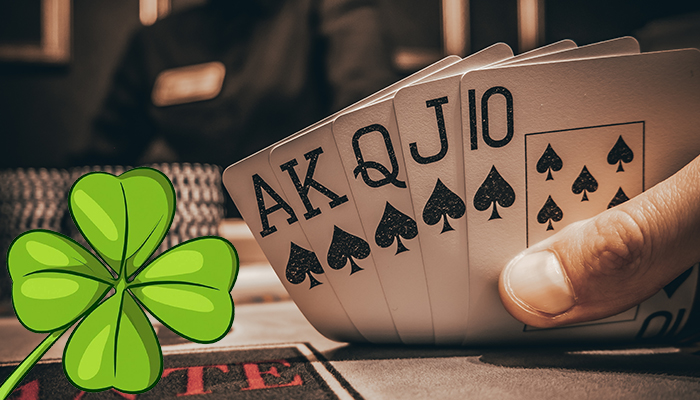Is Poker a Game of Skill or Luck?
 Is Poker a Game of Skill or Luck
Is Poker a Game of Skill or Luck
Anyone who plays poker even semi-regularly is going to tell you that it is both. The better player is more likely to win the longer they play, but anything is possible in the time range of a few thousand hands.
Is it possible to crush a pro in a short weekend game in Las Vegas? Absolutely, especially in no-limit games where it really only comes down to a few hands over the course of eight or ten hours of play. Can you come out ahead against a very skillful player over the course of a year, playing every weekend? Absolutely not. So, let’s discuss poker luck vs. skill.
Is Poker a Game of Chance?
Poker is a game of chance in that we don’t have all of the information available, and even after we have completed all the strategy, more cards can come along that will change the outcome of our carefully played plan.
Another name for this luck is simply variance. Perhaps we have played our hand perfectly, and the odds of the only card that can beat us coming out on the river are a dozen to one. But that means sometimes that card will come out, and if it is a big bet in a no-limit game, it may cost us our entire trip bankroll.
This doesn’t happen in a game like chess, where it is almost unheard of for a much lower-ranked player ever even to beat a grandmaster once. Because in chess, all the information is available, the best player will use it to their advantage. There is no element of luck or chance. No small percentage that the enemy queen might show up unexpectedly to foil our plans.
Now, over time, that variance will fall away. We will gain our expected value (EV), and generally, the best player will wind up on top. But take the example of a poker tournament. Generally, the best players make it to the final table.
But there will always be amateurs at the final table as well because while there may be many hours played before the final table, it is not long enough to separate the wheat from the chaff, and because the best players can be eliminated in a single hand, a lot of luck comes into play.
This is even more evident in the play at the final table, as just a few large hands will probably make the difference with chance playing a starring role. Lose to a draw to an inside straight on a dry board that you didn’t see coming and see if you still wonder if poker is a game of chance.
Is poker a game of skill or luck is always a tough question to answer when you’ve just taken your third bad beat of the evening.
But the more hours you play or the more tournaments you play, the less that variance will play a role. Getting rivered in the final hand in one tournament is one thing, but being eliminated by a small percentage draw in a hundred tournaments is quite another.
Is Poker a Game of Skill?
The number of hands played, like Leonardo carefully chipping out the David from the granite block, will eventually reveal the masterpiece within, or in some cases, the useless pile of rock. Time played sands down the variances and chance and generally leaves the better player on top.
Poker becomes a game of skill when we get to the long term. If you have played 100 hours and are losing, then you are not the best poker player in that game. As the old saying goes, if you look around the poker table and don’t see the sucker, the sucker is probably you.
It’s possible that the best player at a table might lose over a weekend or even more. Still, it’s just as likely that the person who believes themselves to be the best isn’t that they need to work on range calculations and tighten up their betting and the number of flops they see.
When we ask if poker is a game of skill in the long term, the answer is yes, but that should never be an excuse for thinking I’m losing recently due to bad luck. That may well be the case, but it’s poker suicide not to take a long deep dive on every aspect of your game if you begin losing in the medium term.
Is Poker a Game of Luck?
Poker is luck when we don’t control all the things that we can exert at least some control over. If the best player wins in the long term the game they are playing in, then we need to try and pick poker games where we are that best player. If we know that our skill level can be determined by our wins and losses over the year, then we need to carefully and methodically graph these.
If we know that a medium-term downturn in wins can be a case of us either choosing more challenging games or developing a leak in our game, it would be malpractice not to weigh our game options or tighten up our game. Perhaps play in more regional poker tournaments instead of once a year in the WSOP or play more lower minimum Limit than No Limit.
We allow poker to become nothing more than mere luck when we don’t do our due diligence and study other players. Poker is a game of what you do and what your opponent does. You can’t be a skilled player if you don’t know what you need to do with the hand dealt you. But even more importantly, you haven’t got a clue what your opponent is trying to do with theirs. Strengthen your game but look for holes in theirs.
You should consistently be looking for any information that might help you understand not only what your opponent is doing now, but what he has attempted to do in the past, and how he might play a slightly different hand in the future.
Is poker luck in the long term? Only if we let it be.
Conclusion
Many detailed studies, especially around online poker sites, have shown a strong correlation between where a player is currently ranked and their expected future rankings. This study shows that players in the top 1% of profitability in an earlier time frame were more than 12x likely to be still in the top 1% in a future time frame.
This kind of real-world data, with hundreds of millions of hands tracked, leaves little doubt that in poker, luck vs skill is heavily weighted toward skill in the long run. And because of the robust sample size, they can even give us a good idea of what long-term means. According to their research, luck gives way to skill in about 1500 hands.
While anything can happen over a few hours of poker on any given night, there can be no doubt that over the course of thirty or forty hours playing that, the best player on any given table will be seeing the best of the “luck”. Is poker a game of skill or luck? The evidence is in.




